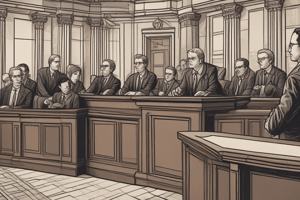Podcast
Questions and Answers
Who expressed the sentiment that it is better for guilty persons to escape than for one innocent to suffer?
Who expressed the sentiment that it is better for guilty persons to escape than for one innocent to suffer?
- The King
- The police
- Sir William Blackstone (correct)
- Justice Campbell
What is being violated by judges, legislators, and police according to the text?
What is being violated by judges, legislators, and police according to the text?
- The rights of the innocent
- The constitution (correct)
- The monarchy
- The common law
Why do we have less liberty today compared to subjects living under a monarchy?
Why do we have less liberty today compared to subjects living under a monarchy?
- Because of the constitution
- Because of the benefit of the common law (correct)
- Because of the actions of judges, legislators, and police
- Because of the violation of the common law
What is the common law principle mentioned in Magna Carta?
What is the common law principle mentioned in Magna Carta?
What does the common law aim to do?
What does the common law aim to do?
When can an arrest without warrant be lawful?
When can an arrest without warrant be lawful?
Flashcards are hidden until you start studying
Study Notes
The Importance of Common Law and Due Process in Arrests
- The common law, established in Magna Carta, states that no one shall be arrested or imprisoned except by the law of the land.
- The common law is made constitutional law by the due process clause.
- Despots may disregard the common law and impose their will through corrupt statutes and judicial opinions.
- There is a conflict between fundamental law and the will of despots in determining the controlling law regarding arrests.
- Anderson's Treatise on the Law of Sheriffs emphasizes the importance of common law in arrests, stating that there can be no arrests without due process of law.
- Public officials today do not adhere to the common law principles, finding them restrictive in their pursuit of criminals.
- The common law aims to restrict those in government, ensuring that proper procedures are followed and protecting people's rights.
- Sir William Blackstone expressed the sentiment that it is better for guilty individuals to go free than for one innocent person to suffer.
- Constitutions in this country were written to restrict the actions of those in government, but they are frequently violated by judges, legislators, and police in regards to arrests.
- Officials who violate the law of the land are considered lawbreakers.
- Subjects living under a monarchy had more liberty because they benefited from the common law principles and maxims that protected life, liberty, and property.
- The erosion of common law and due process has led to a decrease in personal liberties in society.
Studying That Suits You
Use AI to generate personalized quizzes and flashcards to suit your learning preferences.





